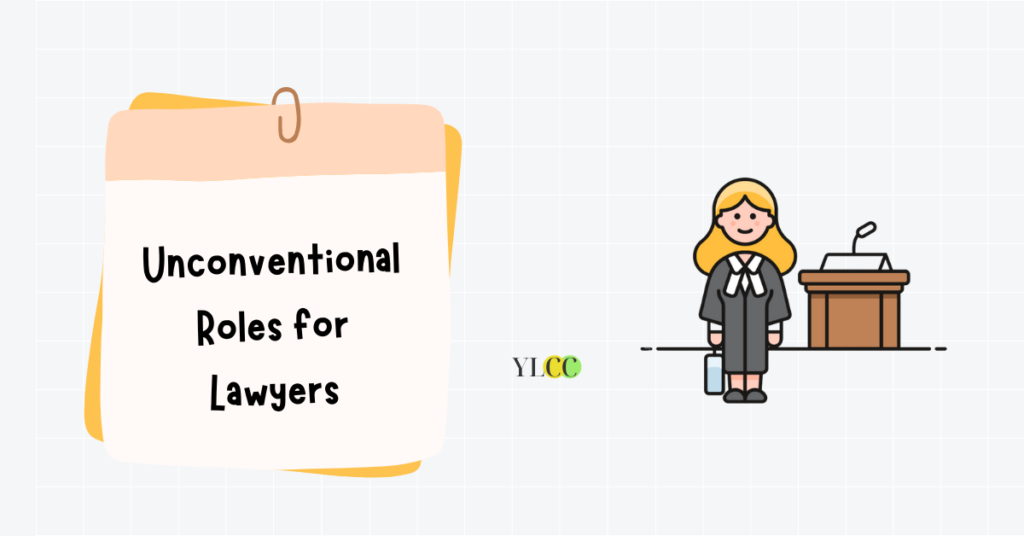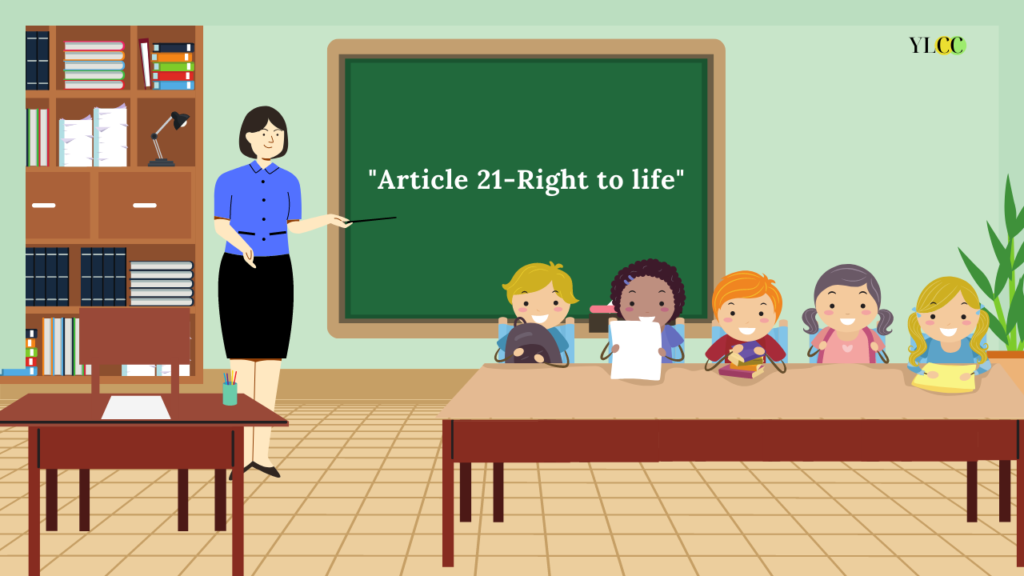
“There is no better way to exercise the imagination than the study of the law.”- Ralph Waldo Emerson
Being a lawyer is almost always associated with practicing litigation, working in a law firm, or as an in-house counsel or in the judicial services. However, with these areas becoming more and more saturated, especially in a rather depleted post-Covid situation, law graduates and lawyers alike are seeking out alternate career choices in niche areas that have better growth opportunities.
In this article, Team YLCC explores some of the unconventional, less explored career avenues for lawyers.
- Teaching and Academia
With an increasing number of law colleges in the country, career opportunities in the educational sector have also been on the rise. Good lawyers who have a respectable academic track record are mostly welcomed into taking up teaching roles, albeit depending upon the qualifications. To begin with, for a full time position in India, one is required to qualify for the UGC-NET (National Eligibility Test conducted on behalf of the University Grants Commission) exam and have an LL.M in any particular field of law. Later, one may also be required to complete his or her Doctorate Program in Law. On the other hand, there are a plethora of opportunities for part-time positions at coaching institutes, EduTech Companies, etc. Experienced lawyers may also choose to work as a freelancer assisting law students and professionals with career counselling and guidance in the industry.
Already practicing lawyers are in a unique position as they are often recruited by law schools to provide students with some degree of practical knowledge from the day-to-day nuances of the profession which is not otherwise feasible through simple classroom instruction.
- Journalism
The skillset required to be a lawyer and a journalist are vastly similar in several aspects. Both are required to persevere and be intuitive, diligent, thorough and responsible. Communication skills are a top priority for both professions as both are often required to be straightforward, even argumentative. The Press Trust of India, therefore, has a special provision which allows for the recruitment of law graduates as journalists at an agency.
Today, most leading print and electronic media outlets like the Times Group have a number of legal/political correspondents in their core teams. Such correspondents usually have a degree in law and specialize in constitutional/criminal law. Offering expert analysis and insight into issues relating to their field constitutes a major share of their work profile. In some cases, journalists with a background in law also prefer to pursue investigative journalism.
Legal journalism is also a niche subset of journalism that has developed massively in recent times. It includes providing exclusive coverage for legal news, court cases and proceedings, law school news and similar issues. New initiatives like Livelaw, Legally India, Bar and Bench have opened up a whole new paradigm for law graduates who wish to venture into this exciting field.
- Digital Marketing
The marketing world has expanded greatly with the advent of social media and digital marketing. If you are more on the creative side, marketing is an alternative career for lawyers to consider. In a marketing role, one is required to assess latest trends and predict consumer response. Along with these qualities, in-depth knowledge about a number of subjects like intellectual property law, media law and the like can be immensely beneficial to a lawyer as a digital marketer.
Marketing is an acquired skill and one can easily teach themselves the digital marketing skills required with one of the many online courses on the internet with free or paid access. Once you’ve learnt the ropes, you have the option of working in-house (at a start-up or an established business), at an agency or freelancing.
- Public Relations (PR)/ Human Resources (HR)
Lawyers are known to have superlative communication skills and a sharp sense of diplomacy. This allows them to deliver solid performances in highly competitive environments under pressure.
Subject to adding some degree of professional training, lawyers can become well-suited to roles that primarily involve dealing or negotiating with people. Another significant advantage that makes lawyers highly eligible for ‘people’ roles is the thorough knowledge of labour and related laws, as well as contract drafting. They are also likely to understand better what legal implications a particular decision or policy would spell for the company in the long-term. Lawyers are increasingly being called on to provide counsel in crises, and some international firms are even offering in-house communications advisory services.
One may choose to apply for a Public Relations/ Human Resources (or Client Management) role at Corporates, Event Management firms and other similar organisations.
- Alternate Dispute Resolution (ADR)
Alternate Dispute Resolution (ADR) refers to a confidential and alternative method of tackling legal disputes which avoids the traditional route of litigation. The most common types of ADR are mediation, conciliation and arbitration.
The system of dispensing justice in India has come under great stress for several reasons, especially because of the huge pendency of case in district as well as courts. The situation has compelled the authorities to seek out alternate procedures for dispute resolution, in an attempt to divert the increasing burden from the courts. Legislative measures in the form of the Arbitration and Conciliation Act, 1996 has been a significant step forward in resolving this conundrum. This has given rise to a somewhat untapped space for lawyers to establish their practice. Although mediation and conciliation verdicts are not legally binding, arbitral awards are an exception.
Today most leading law firms in India have dedicated teams for arbitration, and a number of lawyers continue to pursue a successful arbitration-only practice. Even courts today are pushing for ADR as an initial recourse instead approaching the judiciary at the first instance.
- Politics
Considering the state of affairs of politics in India, it as well may be a unanimous opinion that more and more educated people need to venture into the country’s political executive and hold public offices that strongly influence the nation’s developmental trajectory.
Law is considered to be one of the noble professions in India as lawyers have the acumen to bring about real change in society and influence people’s lives for the better. Professionally speaking, lawyers are perhaps the most qualified individuals to enter mainstream politics as they are well acquainted with the operational know-how and possess the requisite analytical skills to tackle issues of national or public importance. Being able to read large volumes of text also Lawyers are also, by nature, good and commanding speakers- another skill that serves in good stead while making public speeches as a politician.
More lawyers into the core political forces of the country are also likely to translate into reduced corruption and efficient, decisive functioning of the government, especially the legislature and the executive. Mahatma Gandhi, Late Shri Arun Jaitley, Ram Jethmalani, Kapil Sibal, Sushma Swaraj, P. Chidambaram and Subramaniam Swamy are some of the most eminent names among lawyer-turned-politicians.
- Civil Services
The prestigious Union Public Service Commission (UPSC) Examination for entry into the Indian Administrative Service (IAS), Indian Police Sevice (IPS) and other public services are also a very lucrative option for law students who wish to assume public office and serve the society.
Although the exam is intensely competitive, law students have an advantage in the sense that they are quite familiar with certain sections in the syllabus such as Indian History, Indian polity and an overall strong command over the English language which has been given significant weightage in the paper.
- Public Policy Analysis
Lawyers with an acumen and inclination towards research may choose to work in think tanks that operate in the arena of public policy. Think tanks are usually consulted by governments to support the latter’s work by bring in perspective on new policies and addressing concerns of all stakeholders through conducting research projects, collecting real-time data and presiding over consultation sessions.
Most think tanks have various verticals within the organization, each of which cater to a particular requirement. Given the close links between various sub-disciplines of law and policy, it is obvious that lawyers would be eligible for multiple positions in such think tanks.

Association for Democratic Reforms (ADR), Centre for Civil Society (CCS), Centre for Developmental Studies (CDS), Centre for Public Policy (CPP) and Centre for National Policy Research (CNPR) are some of the major think tanks in India.
- Entrepreneurship
Traits like leadership, strong problem-solving skills are commonly associated with lawyers. These traits can be extremely valuable when venturing into an entrepreneurial venture as businesses take extensive planning and patience to develop.
Perhaps the most notable among legal startups is the Eastern Book Company- an internationally reputed publishing house for legal academia which was established in the 1940s in Lucknow by two brothers. In the past decade, a number of initiatives in various fields of law such as Lawctopus, LawSikho, iPleaders and Livelaw, have snowballed into thoroughly successful ventures, both in terms of revolutionizing their respective industries but also in terms of revenue.
- Content Writing and Generation
Lawyers and freshers who are excellent at drafting often prefer content writing as a convenient career avenue. Content writing as a lawyer may include a number of work profiles such as contract drafting, blog writing for law firms or legal websites, drafting courses in a specialized field of law for students, etc.
Other types of content may include videos or tutorials on topics of law, made for educational purposes on platforms such as YouTube or for commercial use by any organization.
Contrary to popular perception, content writing or generation, if pursued full-time, can be extremely rewarding in terms of revenue. For example, a moderately in-demand content writer may charge anywhere between 2-3 INR per word and 10-15 INR per second of video depending on the assignment.
To sum up things in perspective, a degree in law inculcates a rather versatile range of skills in an individual that opens up a variety of opportunities for the individual. It is then up to the lawyer to hone, enhance and expand his skillset to match these unconventional roles. It is important to put some thought into what you love to do as a person, prioritizing as to which area will be financially as well as intellectually rewarding.
YLCC would like to thank Sourajit Bhattacharyya for his valuable inputs in this article.






